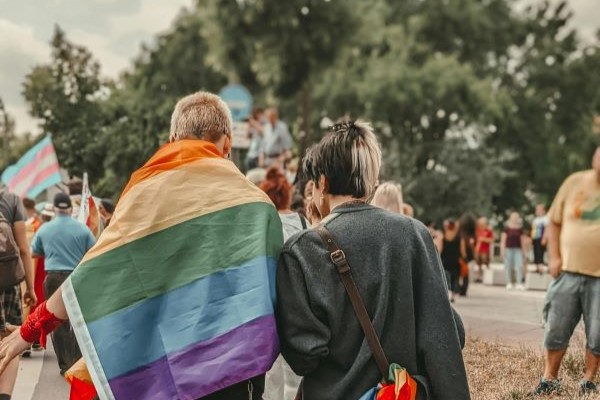
Democracy’s Sledgehammer: The Use of the Notwithstanding Clause for Saskatchewan’s Bill 137, “The Parent’s Bill of Rights”
In August 2023, the Saskatchewan government enacted a policy pursuant to the Education Act. Titled "Use of Preferred First Name and Pronouns by Students," the policy requires schools to obtain parental consent for students under 16 before using their chosen name, gender identity, or gender expression.
By Rachel Loewen Walker, Assistant Professor and Program Chair, Women's and Gender Studies, University of Saskatchewan (USask) and Temitayo Adesanya, LLM Candidate, College of Law and Graduate Research Assistant, Social Innovation Lab, USaskIntroduction
Download the JSGS Policy Brief
Download the Discussion questions
The policy also requires that parents and guardians are informed about the sexual health education curriculum in schools and that they are able to decline their children’s participation in sexual education and stipulates that all schools across the province must immediately cease any involvement with third-party organizations that provide education on sexual health education and gender.
In response to this policy, the UR Pride Centre for Sexuality and Gender Diversity (UR Pride), a non-profit organization actively involved in advocating for 2SLGBTQ+ people in Regina, contacted the government of Saskatchewan, requesting that it suspend the policy implementation. The government denied the request. As a result, UR Pride filed an action against the Government to halt the policy, contending it could have detrimental effects on trans, non-binary, and gender-diverse students.1 Arguing that the policy undermines inclusivity and discriminates against non-traditional family structures and 2SLGBTQ+ students, UR Pride requested an injunction to delay the implementation of the policy. On September 19, 2023, the injunction was granted by Justice Megaw of the Court of King's Bench.2
After the injunction was granted, the Saskatchewan government indicated that it would invoke the notwithstanding clause from the Canadian Charter of Rights and Freedoms in order to pass Bill 137, or the "Parents' Bill of Rights," replacing the policy with legislation in order to circumvent the court-ordered injunction. Despite criticisms from the Saskatchewan Advocate for Children and Youth, the Saskatchewan Human Rights Commission, the official opposition,3 teachers,4 medical professionals,5 legal scholars,6 and many members of the public,7 the "Parents' Bill of Rights" was passed into law on October 20, 2023. Bill 137 amends the Education Act of 1995, with respect to parental rights, and represents a significant policy development on this matter.8
According to the government of Saskatchewan, the primary legislative intent of the bill is to affirm and strengthen the role of parents in educational processes, particularly with regards to sexuality and gender diversity.9 The bill explicitly asserts that parents have the "right to be informed," which includes timely access to a wide range of information about their children's schooling experiences and increased participation in their children's education on matters that range well beyond topics related to gender identity and sexual health education.
The legislation triggered ardent debate around the rights of parents to have a say in relation to gender identity, expression, and sexual health education in schools and the rights of adolescents under the age of 16 to make decisions about their gender identity and expression in school without their parents’ knowledge or consent.
Pointing to an Angus Reid public opinion survey on a similar policy introduced by the Government of New Brunswick, Premier Scott Moe maintained there was strong support from Saskatchewan respondents, however the survey referenced was conducted prior to any discussion of such a policy in Saskatchewan.10 A later Angus Reid survey of only Saskatchewan residents reported 44 per cent who “strongly support” the passing of a bill that “requires school divisions to seek parental consent if a student younger than 16 wants to be referred to by pronoun or name at school other than the one they are registered as,” and 31 per cent who strongly oppose the bill.11 Notably, the same survey demonstrated that 48% of respondents believed that there should be exceptions to the policy if it is believed that the adolescent may be in an abusive household, while 43% indicated that no exceptions should be made.12
While Bill 137 increases parental involvement in their children's education, its implementation, especially through the notwithstanding clause, raises significant concerns regarding its impact on the rights of children and youth in Saskatchewan. Thus, the Court of King's Bench ruled on February 16, 2024, that the UR Pride Centre may proceed with its lawsuit against the Government of Saskatchewan despite the government's use of the notwithstanding clause to pass the bill.13 This paper explores the use of the notwithstanding clause in this context, evaluating whether it serves as a necessary protection for parental rights or constitutes an overreach that could undermine the fundamental principles of public education and individual rights and freedoms.
Increased Parental Involvement in Education and Consent for Name and Pronoun Changes
Bill 137 reinforces parents or guardians as the principal decisionmakers in their child's education, entitling them to consistent updates on their child's attendance, behaviour, and academic achievements. Furthermore, it grants parents the authority to be informed about the curriculum and various learning modalities, including online courses, thus enabling them to make informed decisions about their child's course enrollments.
The legislation states that parents have the right to be informed about school policies and any disciplinary actions or investigations conducted on their child. It also mandates that parents must be involved in their child's medical or dental care at school by requiring their prior consultation before any examinations or treatments are administered. Finally, it allows parents to exempt their child from participating in sexual health education presentations. To do this, they must submit a written notice to the school principal, which should include the specific content and the dates of the sessions they wish their child to be exempted from.
Regarding names and pronouns, the legislation outlines that when a student under 16 desires to be recognized by a “gender-related preferred name or gender identity,” school employees must obtain parental consent before accommodating this request. This is known as the "outing requirement." If obtaining such parental consent could potentially harm the student, the school's principal is tasked with guiding the student toward qualified professionals. These experts are then responsible for formulating a strategy to safely engage the parents on the matter, ensuring the student's well-being is prioritized while navigating these sensitive discussions. However, even if the process is deemed unsafe, parental consent is ultimately required. Where parental/guardian consent is absent for a student under 16, the bill imposes the "misgendering requirement,”15 or the use of incorrect pronouns and language to refer to the student.
Use of the Notwithstanding Clause
Bill 137 explicitly invokes the notwithstanding clause, as provided in section 33 of the Canadian Charter of Rights and Freedoms, to ensure the enforcement of the bill, over and above the provisions of sections 2, 7, and 15 of the charter. The "notwithstanding clause" allows a federal or provincial legislature to enact legislation that explicitly operates despite the violation of certain sections of the Charter, as long as the government names the specific sections. In this case, section 2 protects our fundamental freedoms, including freedom of conscience, religion, opinion, expression, and gathering in groups, while section 7 includes our legal rights, requiring the government to respect the basic principles of justice and fairness whenever they intrude on life, liberty, and personal security, and section 15 indicates that every individual in Canada “regardless of race, religion, national or ethnic origin, colour, sex, age or physical or mental disability” is to be treated with respect and dignity.16
Once used, the notwithstanding clause can only last for five years before the government is required to pass the law again through the legislature if they want it to continue. Charter rights not named in the clause will continue to apply.
The Bill also invokes the notwithstanding clause (section 52) of the Saskatchewan Human Rights Code (SHRC) in order to prevent the application of sections 4, 5, and 13 of the SHRC. Section 4 covers the right to freedom of conscience, opinion and belief, section 5 covers the right to freedom of expression, and section 13 regards the right to education without discrimination.17
Historically, the notwithstanding clause was included in the Charter as a compromise to gain provincial support for the patriation of the Constitution and the entrenchment of the Charter of Rights and Freedoms in 1982. According to Howard Leeson, one of the architects of the clause, the intent was for it to be invoked only after all court matters related to planned legislation had completed the normal judicial review process.18 Thus, the clause was meant to be used sparingly, as a "last resort," not as a routine tool to override Charter rights.19
By invoking both notwithstanding clauses, the Government of Saskatchewan’s legislation seeks to pre-emptively address and neutralize potential legal challenges following the passing of the bill. Furthermore, it protects the Crown and educational authorities, granting them immunity from legal proceedings. This means no lawsuits can be filed against these bodies for any purported loss or damages that could result from the implementation or enforcement of the law. It also eliminates the possibility of the courts reviewing the legislation under the specified Charter sections lending experts to argue that using the clause pre-emptively, before a court has even ruled on the legislation, as in this case, goes against the original intent and purpose of the clause.20
Criticism of Bill 137
Criticisms of the "Parents' Bill of Rights" include its negative impact on 2SLGBTQ+ youth, its anticipated barriers to inclusive education, and its restrictions on the discussion of sexual orientation and gender identity in schools. For instance, while many parents have their children’s best interests at heart and will act accordingly, experts have argued that this bill gives parents too much power to override decisions about a child's education, including whether they can use their chosen name and pronouns at school. This could force gender-diverse students to either be closeted or "outed" to their parents against their will.21 Consequently, this could lead to a lack of support for gender-diverse students, potentially forcing them to conform to identities that do not align with their own and to withdraw from friends and family, both of which will have a detrimental impact on mental health and well-being.
Critics also believe that this legislation undermines the ability of schools to create safe and inclusive environments for 2SLGBTQ+ students, and that it could expose them to increased bullying, harassment, and harm. This perspective is supported by child health experts who assert that allowing students to socially transition at school is a "normal and healthy" part of their exploration.22 Denying this opportunity contradicts professional recommendations. In fact, the Saskatchewan Human Rights Commission called the bill "disappointing and polarizing" and urged the government to reconsider, citing potential effects on vulnerable youth.23
On the topic of sexual health education, the bill places a high burden of notification on teachers and allows parents to easily opt their children out of these education sessions, sessions which range from information on sexual health, gender diversity, and sexual violence. Experts argue that this puts children at greater risk by limiting their access to information about consent, healthy relationships, and protecting themselves.24 Furthermore, allowing parents to opt out of some lessons could lead to a fragmented education system where students receive inconsistent information based on their parents' beliefs rather than a standardized curriculum designed to promote comprehensive learning.
The initial policy banned any external organizations from providing sexual health education in classrooms.25 Although not identified explicitly in Bill 137, as of May, 2024, this ban remains in effect, cutting off more than a decade of collaboration between school divisions and community organizations such as UR Pride, Saskatoon Sexual Health, OUTSaskatoon, Planned Parenthood Regina, the Saskatoon Sexual Assault Centre, the ARC Foundation, and others.26 These organizations have regularly worked with teachers and principals to provide age-appropriate sexual health education in alignment with approved curriculum and have been proven to extend educational capacity, support students beyond the classroom, and to increase feelings of acceptance and inclusion. Furthermore, these education programs have been historically supported by grants from the Ministry of Education.27 These shifts from Bill 137 negatively impact 2SLGBTQ+ youth, who may rely on sexual education as an important source of information and support.
Beyond the direct impacts on education and 2SLGBTQ+ youth, the Parents’ Bill of Rights may increase tensions in already contentious areas, such as divorce proceedings and parental rights disputes, as they could be interpreted as giving more power to parents at the expense of considering the best interests of the child.28 Also, the use of the notwithstanding clause to override Charter protections, especially in a pre-emptive manner before the legislation has been tested in court, risks damaging Canada's reputation as a global leader in human rights. This use potentially undermines the effectiveness of the Charter and weakens the checks on governmental power it was meant to provide. It follows that the introduction of similar "parental rights" bills in other provinces is a significant concern as Saskatchewan’s legislation might encourage other provincial governments to pursue similar legislation, further eroding 2SLGBTQ+ rights and inclusive education across the country. We have already seen similar policies, if not legislation, enacted in New Brunswick and Alberta, contributing to inconsistent treatment of 2SLGBTQ+ youth across the country and undermining the national commitment to equality under the Canadian Charter.
Unsurprisingly, it has been argued that by invoking the notwithstanding clause, the Saskatchewan's Parents' Bill of Rights violates several sections of the Canadian Charter of Rights and Freedoms and sections of the Saskatchewan Human Rights Code. Specifically, the outing requirement and misgendering of children under 16 whose parents refuse to consent to their request for a preferred name, gender identity, and/or gender expression, violates section 7 on the right to security of the person, section 12 on the right not to be subjected to cruel and unusual treatment or punishment, and section 15 on equality rights.
According to some critics, this is unprecedented for legislation targeting the rights of children and youth, as the notwithstanding clause has never before been used to override the Charter rights of minors.29 The Canadian Civil Liberties Association sees the policy as a "stain on the history of the province."30 By passing Bill 137 into law, the association argues that the government has created a regressive environment that violates the fundamental rights of gender-diverse students and is contrary to previous practices and policies within Saskatchewan school divisions. Not only were there no previously mandatory policies for outing and misgendering students under 16, but there were previously progressive practices and policies in place aimed at supporting the chosen names, pronouns, and privacy of gender-diverse students.
It is noteworthy that the court previously granted an injunction against the original policy, “Use of Preferred First Name and Pronouns by Students,” accepting expert evidence that the requirement for parental consent would cause "irreparable harm" to gender-diverse students under 16. This harm includes increased risk of violence, discrimination, depression, anxiety, and suicidality. Thus, by overriding the court's injunction through the use of the notwithstanding clause, the government is disregarding the serious harm that will be inflicted on vulnerable youth. Also, focusing on parental control over a child's name and pronouns, rather than the best interests of the child, raises concerns about state-sanctioned violence against gender-diverse youth, which is contrary to the judicial decision in Young v. Young,31 which prioritised the interest of a child.
While the notwithstanding clause is a legitimate part of Canada's constitutional framework, its use in this context could be seen as a legal sledgehammer that circumvents the protective role of the judiciary and undermines public education in Saskatchewan. Normally, courts would assess whether a law unjustifiably infringes on Charter rights, balancing individual rights against public interests. However, by pre-empting judicial review as in this case, the clause removes a crucial check on legislative power, leaving the affected rights of children and youth without the safeguard of judicial protection.
Conclusion
Clearly, the Saskatchewan Parents' Bill of Rights raises substantial legal and ethical concerns by prioritizing parental authority over the well-being and rights of children, particularly those who are gender-diverse. While it is framed as a measure to increase parental involvement in education, the bill risks causing significant harm to vulnerable students by undermining their autonomy and safety. The bill's use of the notwithstanding clause to circumvent judicial scrutiny of policies related to gender identity and expression further escalates these issues, setting a troubling precedent that could have far-reaching consequences not only for Saskatchewan but for the entire country, and in fact, we are already seeing invocations of Saskatchewan’s process by the Government of Alberta, which has proposed more exhaustive policy and legislation related to gender diversity and expression in schools, healthcare, and sport. Furthermore, the Court of King's Bench's decision to allow UR Pride to proceed with its lawsuit underscores the serious constitutional questions raised by the enactment of Bill 137. This legal challenge serves as a crucial test of the balance between parental rights and children's rights under Canadian law, particularly in the context of educational settings and personal identity. It will play a vital role in defining the limits of parental authority and the scope of children's rights in Canada, shaping the landscape of educational law and children's rights for years to come.
Ultimately, the Saskatchewan government's use of the notwithstanding clause in Bill 137 represents a significant overreach that disregards the Charter rights of gender-diverse youth. Educators, legal experts, and human rights advocates must continue to scrutinize and challenge such legislative efforts that, while claiming to protect family values, will infringe upon the fundamental rights of young individuals to explore and express their identities safely and freely within the educational system. This unprecedented action is seen as potentially causing irreparable harm to a vulnerable population and undermining the fundamental principle of the best interests of the child.
Note: The Government of Saskatchewan has since appealed the decision by Justice McGaw to allow the case to proceed regardless of the use of the notwithstanding clause. On September 23rd and 24th, 2024, both legal teams returned to court on this matter.
Rachel Loewen Walker

Dr. Rachel Loewen Walker is an assistant professor and the program chair of the Women's and Gender Studies program, in Political Studies at the University of Saskatchewan and the director of the funded Social Innovation Lab on Gender and Sexuality, an interdisciplinary, community-led knowledge mobilization hub, that works with students, community organizations, and researchers to action projects for community partners.
Dr. Loewen Walker also teaches in the College of Law, where she served as the Ariel F. Sallows Chair in Human Rights from 2020-2022. Alongside research in human rights, social justice, queer theory, and 2SLGBTQ+ communities, Dr. Loewen Walker works on non-profit leadership and governance, policy analysis, and organizational theory. It is in bringing these multiple points of contact that she aims to open up spaces for social change, cultural diversity, and greater collaboration across non-profit, university, governmental, and other spheres.
Temitayo Adesanya

Temitayo Adesanya is a Graduate Research Assistant at the Social Innovation Lab, where she is deeply involved in advancing equity, human rights and social justice. She earned her Bachelor of Laws degree from the University of Lagos, Nigeria, in 2019 and completed her qualifying certificate at the Nigerian Law School, Abuja, in 2021. She is currently in her second year of a thesis-based Master of Law program at the University of Saskatchewan, where her research area aims to understand how regulatory frameworks can promote green hydrogen in Nigeria's low-carbon transition through a Comparative study. Outside of her research, Temitayo enjoys reading personal growth books, exploring new cultures, and engaging in community service.
[1] The original policy having been rescinded, the government of Saskatchewan has removed the original webpage with the policy title. See instead for details of the policy: Saskatchewan, “Education Minister Announces New Parental Inclusion and Consent Policies,” August 22, 2023. https://www.saskatchewan.ca/government/news-and-media/2023/august/22/education-minister-announces-new-parental-inclusion-and-consent-policies
[2] UR Pride Centre v. Saskatchewan, 2024 SKKB 23 (2024). https://ablawg.ca/wp-content/uploads/2024/02/UR-Pride-Centre-for-Sexuality-and-Gender-Diversity-vs-Sk-2024-SKKB-23.pdf
[3] Ibid.
[4] “Parents’ Bill of Rights Becomes Law in Saskatchewan,” CKOM News, October 20, 2023. https://www.ckom.com/2023/10/20/parents-bill-of-rights-becomes-law-in-saskatchewan/
[5] Alec Salloum, “STF President says Bill 137 opens Sask. Teachers up to 'Legal Jeopardy,'” Regina Leader-Post, October 21, 2023. https://leaderpost.com/news/saskatchewan/stf-president-says-bill-137-opens-sask-teachers-up-to-legal-jeopardy
[6] Brooke Kruger, “Saskatchewan Minister Drilled over Pronoun Policy at Saskatoon Medical Conference,” Global News, November 3, 2023. https://globalnews.ca/news/10069499/sask-minister-drilled-pronoun-policy-saskatoon-medical-conference/
[7] Canadian Civil Liberties Association (CCLA), “CCLA reaction to Bill 137,” October 20, 2023. https://ccla.org/press-release/ccla-reaction-to-bill-137/, and Jason Warick, “Law Professors, Human Rights Commissioner Tell Sask. Government to Shelve Parents' Bill of Rights,” CBC News, October 20, 2023. https://www.cbc.ca/news/canada/saskatoon/law-professors-human-rights-commissioner-tell-sask-government-to-shelve-parents-bill-of-rights-1.7001327
[8] Pratyush Dayai, “Families of Trans Kids, Activists say they're Angered, Scared, Disgusted by Sask.'s Pronoun Law,” CBC News, October 23, 2023. https://www.cbc.ca/news/canada/saskatoon/pronoun-law-bill-137-reaction-transgender-outh-families-1.7003938#:~:text=%22Disgusting%22%20and%20%22disappointing%22,which%20became%20law%20on%20Friday.
[9] Bill 137, An Act to amend The Education Act, 1995 respecting parental rights. 3rd sess., 29th legislature, Saskatchewan (2023). https://docs.legassembly.sk.ca/legdocs/Bills/29L3S/Bill29-137.pdf
[10] Saskatchewan, “‘Parents’ Bill of Rights’ Introduced in Legislature,” October 12, 2023. https://www.saskatchewan.ca/government/news-and-media/2023/october/12/parents-bill-of-rights-introduced-in-legislature
[11] Larissa Kurz, “Moe cites poll in support of preferred pronoun policy in Sask,” Regina Leader-Post, August 28, 2023. https://leaderpost.com/news/local-news/sask-politics/moe-cites-poll-in-support-of-controversial-preferred-pronoun-policy-in-sask
[12] Angus Reid Institute. “Saskatchewan: Majority support government’s gender & pronoun policy but half also say exceptions needed,” December 6, 2023. https://angusreid.org/saskatchewan-gender-pronoun-policy-moe/.
[13] Ibid.
[14] UR Pride Centre v. Saskatchewan, 2024 SKKB 23 (2024).
[15] Misgendering occurs when we refer to a person, especially a transgender or non-binary person, with pronouns or language that does not align with their affirmed gender identity.
[16] Canadian Charter of Rights and Freedoms, s 7, Part 1 of the Constitution Act, 1982, being Schedule B to the Canada Act 1982 (UK), 1982, c 11.
[17] The Saskatchewan Human Rights Code, 2018, SS 2018, c S-24.2
[18] Adam Hunter, “Sask. Government Passes Parents’ Bill of Rights,” CBC News, October 20, 2023. https://www.cbc.ca/news/canada/saskatchewan/sask-parental-rights-law-1.7002088
[19] House of Commons Debates, 44th Parliament, 1st Session, No. 157 (February 9, 2023). Edited Hansard. Speaker: The Honourable Anthony Rota. https://www.ourcommons.ca/documentviewer/en/44-1/house/sitting-157/hansard
[20] Adam Hunter, “Sask. Government Passes Parents’ Bill of Rights.”
[21] Corinne L. Mason & Leah Hamilton, “Opinion: 'Parental rights' legislation increases risk of harm for Alberta students,” Edmonton Journal, January 29, 2024. https://edmontonjournal.com/opinion/columnists/opinion-parental-rights-legislation-increases-risk-of-harm-for-alberta-students
[22] Canadian Paediatric Society, “Gender identity,” June 2023. https://caringforkids.cps.ca/handouts/behavior-and-development/gender-identity
[23] Jason Warick, “Law Professors, Human Rights Commissioner Tell Sask. Government to Shelve Parents' Bill of Rights.”
[24] Ibid.
[25] Saskatchewan, “Education Minister Announces New Parental Inclusion and Consent Policies,” August 22, 2023. https://www.saskatchewan.ca/government/news-and-media/2023/august/22/education-minister-announces-new-parental-inclusion-and-consent-policies
[26] Zosia Bielski, “Sexual Health Educators Remain Barred from Saskatchewan Classrooms as Concerns Rise for Students,” Globe and Mail, May 6, 2024. https://www.theglobeandmail.com/canada/article-saskatchewn-sexual-health-education/
[27] One of the authors (R. Loewen Walker) was a former Executive Director at one of the organizations identified and signed contracts with the Ministry of Education from 2013 until her departure from the organization in 2020. These contracts were to provide gender and sexual health education in Saskatchewan schools, among other activities. See outsaskatoon.ca/annual-reports/ for indication of support from the Ministry of Education
[28] Sam Samson, “Does Saskatchewan's Parents' Bill of Rights help parents or misguide them?” CBC News, November 26, 2023. https://www.cbc.ca/news/canada/saskatchewan/parents-bill-of-rights-saskatchewan-law-help-or-confuse-1.7037210
[29] “CCLA reaction to Bill 137.”
[30] Young v. Young, 4 SCR 3 (1993). https://www.canlii.org/en/ca/scc/doc/1993/1993canlii34/1993canlii34.html

